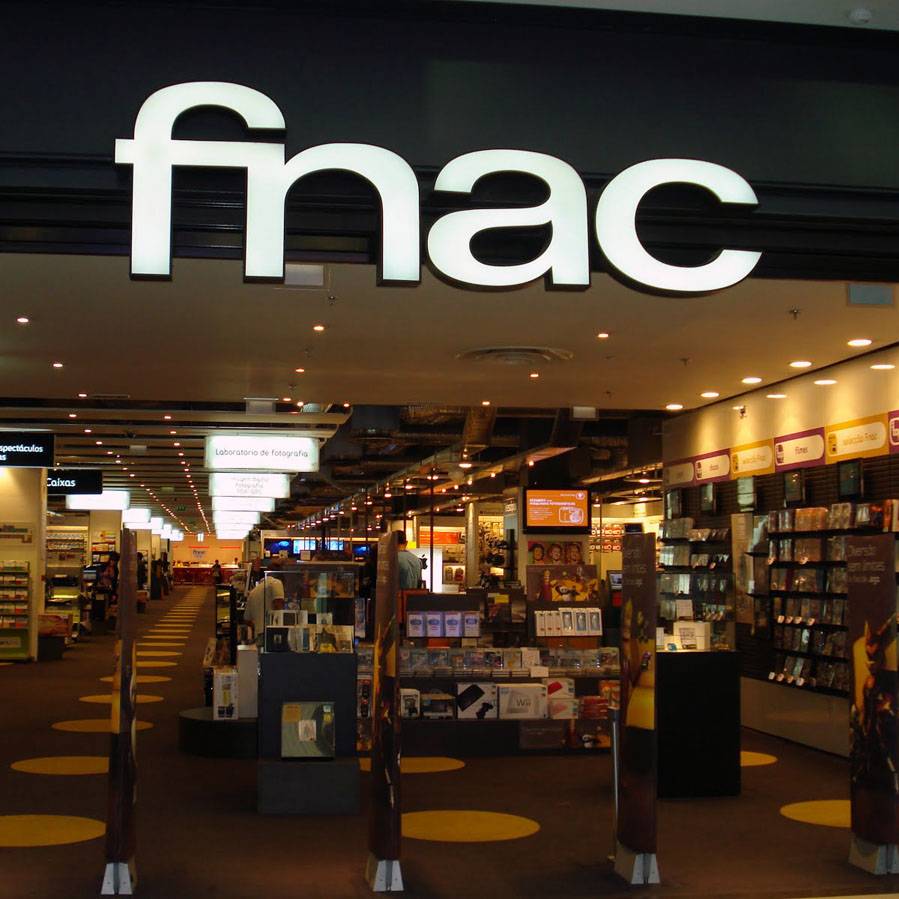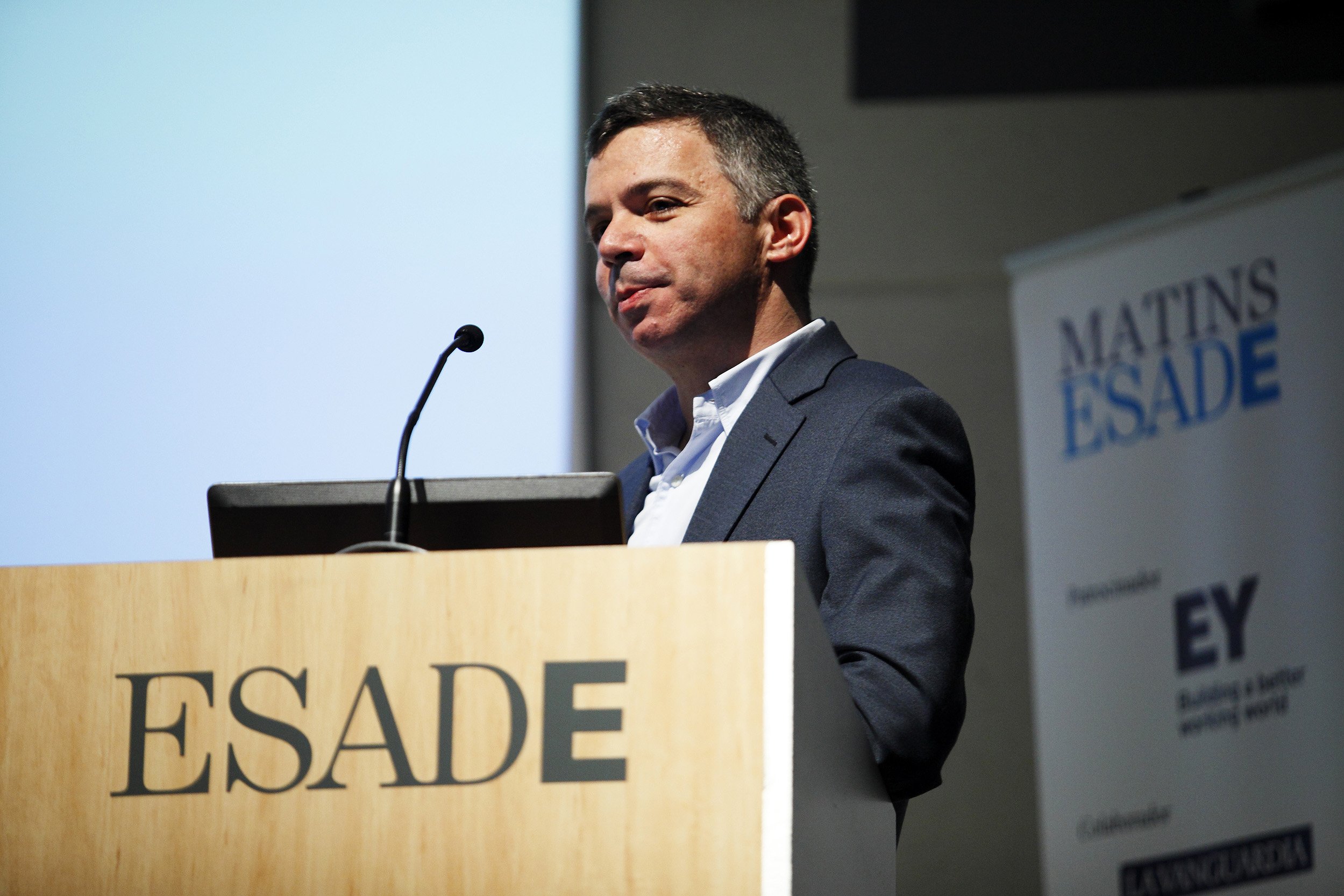11
de Febrer
de
2016 - 03:05
Since 1993, Fnac shops have been part of Spain's commercial landscape. Today, there are 28 establishments that get 35 million visits. They are significant figures, but far from the 90 million visits to its online store. Although the vast majority of sales are in its physical spaces, the French company has not hesitated to take on the challenge posed by the digital revolution. In fact, this commercial network is what Fnac will use to compete with the giants of electronic commerce, such as Amazon, in a sector in which the war that is shaping up for 2016 is to be fought over same day delivery.
Speaking in an Esade conference, Fnac's director general in Spain, Marcos Ruão, says that same day delivery has to become one of the company's strong points. "We are already doing it in Madrid, where the central warehouse is located. However, as we have a lot of shops, we can use the stock in each to cover a good part of the cities in Spain," he revealed. It is a formula that El Corte Inglés also announced it aims to use on Tuesday. In other words, large retailers hope to differentiate themselves from "competition that gives a phenomenal service," but for which the lack of a network of shops can make same day delivery more difficult outside of Madrid and Barcelona.
It is part of a process of change demanded by today's customers. Or as Ruão calls them, "supercustomers. They are always connected, they have the information, they do not have much faith in publicity compared with independent recommendations. Moreover, they are looking for personalised services and a competitive price." Customers want everything everywhere, they have a multichannel attitude, and companies have to make an effort to satisfy them.
Multichannel retailing right now
Ruão explains that in the 23 years Fnac has been in Spain, the last 20 have been with an online channel. However, it is a channel that had not awoken completely until the last five or six years. "Multichannel retailing has really come out of mobile, which is what links the online and offline worlds," he says. The smartphone has unified all of the channels.
"Some 88% of Spanish consumers do online research before buying (ROPO, research online, purchase offline)." For the Fnac executive, this information is relevant because the consumer who gets informed before going to the shop "is more motivated to buy". In fact, online research takes place during the whole process of buying: before, during and even afterwards. Therefore, Ruão insists, "the manner of purchasing has completely changed, and it is no longer a linear process."

A faithful and digital customer
To face this challenge, Fnac has the information it can get from its 800,000 members. A shopper's profile that, mainly, is between 35 and 45 years old. "They are important because we know everything about them," says Ruão. Some 70% still buy exclusively in the physical shops, and only 10% do so exclusively online. The profile that is growing the most, however, is multichannel customers (20%). "It is a "better" customer who buys more and at a higher average price. And they are more faithful customers. It takes a lot to get them, but they are very good," says the Fnac chief.
However, the media through which they communicate is also changing. "In mobile we began strongly with apps, but we are increasingly focusing on responsive websites because the customers do not want so many applications," Ruão recognises. At the same time, this "makes the relationship we manage to build with the customer and securing their loyalty more difficult."
The need to bring the digital and physical worlds into line, however, is not exclusive to traditional large retailers. Purely digital players also feel this demand on behalf of customers, which explains the opening of physical stores by giants of e-commerce, such as Amazon or Alibaba.
Not losing values along the way
If there is one thing of which Ruão is proud as the man in charge of Fnac, it is the fact that "you do not buy products or services, but rather experiences. It is a place of discovery, a place to be, not only to go and buy from." Whatever the case, he admits that this "unique experience is still much better in the physical shops than online. That is what engraves the brand in the customers' minds. Therefore, the challenge of the future is to keep these values in this new digital world."
In fact, according to Ruão, this journey cannot begin without "without being aware of the same values and protecting them." He points out that in Fnac "some 15% of the retail space is dedicated to comfort, which is normally the best location in the store." The diversity and range on offer is also "part of our DNA". Cultural and innovative technological events, as well as the the work of shop assistants complete these values that the company wants to preserve.
Digital opportunities
With a clear awareness of preserving the elements that have helped Fnac reach its privileged position, Ruão trusts in the opportunities of the digital environment. The Fnac head in Spain insists that "we will continue to improve the comfortable spaces so that the customer can spend all day in the shop, charging their mobile, listening to music, reading books… ." They are spaces that coexist with the multichannel service, in which the customer who has purchased online can conveniently pick up their order in person.
Moreover, multichannel retailing also makes it easier to further increase the company's already extensive offering. "The online range is unlimited. That allows us to extend the offer to areas such as technology and sport," says Ruão".
However, it is not only about expanding. This digital stock has also allowed the company to begin opening shops that are much smaller than the usual ones. If the classic Fnac store has between 2,000 and 4,000 square metres of space, the digitalisation of the company allows for the opening of much smaller shops in lesser cities. "Even if it is not right away, you end up offering the same," he concludes.
Speaking in an Esade conference, Fnac's director general in Spain, Marcos Ruão, says that same day delivery has to become one of the company's strong points. "We are already doing it in Madrid, where the central warehouse is located. However, as we have a lot of shops, we can use the stock in each to cover a good part of the cities in Spain," he revealed. It is a formula that El Corte Inglés also announced it aims to use on Tuesday. In other words, large retailers hope to differentiate themselves from "competition that gives a phenomenal service," but for which the lack of a network of shops can make same day delivery more difficult outside of Madrid and Barcelona.
It is part of a process of change demanded by today's customers. Or as Ruão calls them, "supercustomers. They are always connected, they have the information, they do not have much faith in publicity compared with independent recommendations. Moreover, they are looking for personalised services and a competitive price." Customers want everything everywhere, they have a multichannel attitude, and companies have to make an effort to satisfy them.
Multichannel retailing right now
Ruão explains that in the 23 years Fnac has been in Spain, the last 20 have been with an online channel. However, it is a channel that had not awoken completely until the last five or six years. "Multichannel retailing has really come out of mobile, which is what links the online and offline worlds," he says. The smartphone has unified all of the channels.
"Some 88% of Spanish consumers do online research before buying (ROPO, research online, purchase offline)." For the Fnac executive, this information is relevant because the consumer who gets informed before going to the shop "is more motivated to buy". In fact, online research takes place during the whole process of buying: before, during and even afterwards. Therefore, Ruão insists, "the manner of purchasing has completely changed, and it is no longer a linear process."

A faithful and digital customer
To face this challenge, Fnac has the information it can get from its 800,000 members. A shopper's profile that, mainly, is between 35 and 45 years old. "They are important because we know everything about them," says Ruão. Some 70% still buy exclusively in the physical shops, and only 10% do so exclusively online. The profile that is growing the most, however, is multichannel customers (20%). "It is a "better" customer who buys more and at a higher average price. And they are more faithful customers. It takes a lot to get them, but they are very good," says the Fnac chief.
However, the media through which they communicate is also changing. "In mobile we began strongly with apps, but we are increasingly focusing on responsive websites because the customers do not want so many applications," Ruão recognises. At the same time, this "makes the relationship we manage to build with the customer and securing their loyalty more difficult."
The need to bring the digital and physical worlds into line, however, is not exclusive to traditional large retailers. Purely digital players also feel this demand on behalf of customers, which explains the opening of physical stores by giants of e-commerce, such as Amazon or Alibaba.
Not losing values along the way
If there is one thing of which Ruão is proud as the man in charge of Fnac, it is the fact that "you do not buy products or services, but rather experiences. It is a place of discovery, a place to be, not only to go and buy from." Whatever the case, he admits that this "unique experience is still much better in the physical shops than online. That is what engraves the brand in the customers' minds. Therefore, the challenge of the future is to keep these values in this new digital world."
In fact, according to Ruão, this journey cannot begin without "without being aware of the same values and protecting them." He points out that in Fnac "some 15% of the retail space is dedicated to comfort, which is normally the best location in the store." The diversity and range on offer is also "part of our DNA". Cultural and innovative technological events, as well as the the work of shop assistants complete these values that the company wants to preserve.
 |
| Marcos Ruão, director general of Fnac in Spain, explains the digitialisation of the company. Esade |
Digital opportunities
With a clear awareness of preserving the elements that have helped Fnac reach its privileged position, Ruão trusts in the opportunities of the digital environment. The Fnac head in Spain insists that "we will continue to improve the comfortable spaces so that the customer can spend all day in the shop, charging their mobile, listening to music, reading books… ." They are spaces that coexist with the multichannel service, in which the customer who has purchased online can conveniently pick up their order in person.
Moreover, multichannel retailing also makes it easier to further increase the company's already extensive offering. "The online range is unlimited. That allows us to extend the offer to areas such as technology and sport," says Ruão".
However, it is not only about expanding. This digital stock has also allowed the company to begin opening shops that are much smaller than the usual ones. If the classic Fnac store has between 2,000 and 4,000 square metres of space, the digitalisation of the company allows for the opening of much smaller shops in lesser cities. "Even if it is not right away, you end up offering the same," he concludes.